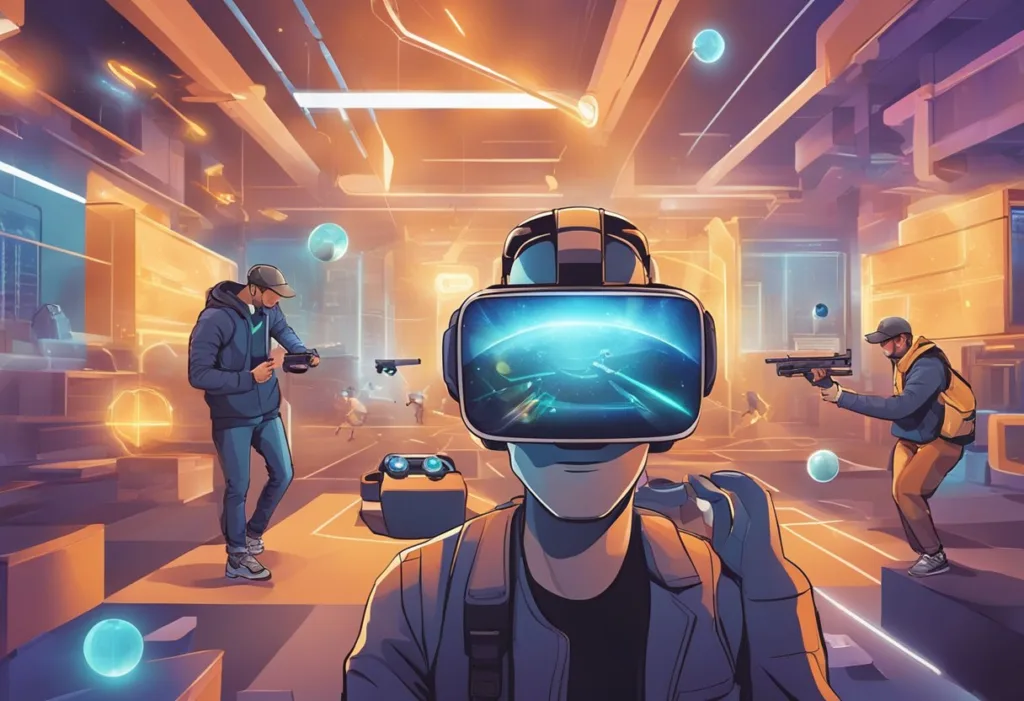Virtual real estate is a relatively new concept that has emerged with the rise of the metaverse and the digital universe. It refers to the ownership of digital assets, such as virtual land, buildings, and other properties, that exist in the virtual world. Virtual real estate is bought and sold using cryptocurrencies and non-fungible tokens (NFTs).
The metaverse, which is a virtual world that is created and inhabited by users, has become a popular platform for virtual real estate transactions. Companies such as Tokens.com and Metaverse Group have emerged to facilitate the buying and selling of virtual real estate. The Sandbox, Decentraland, and Voxels are some of the platforms that have gained popularity for virtual real estate development and management.
Investing in virtual real estate can be a lucrative opportunity for those who are interested in the metaverse and the digital universe. However, it is important to be aware of the risks and challenges that come with this new investment strategy. As the metaverse continues to grow and evolve, virtual real estate is expected to become an increasingly important asset class.
What is virtual real estate?
Virtual real estate refers to digital property that exists in online spaces, also known as virtual worlds or metaverses. This digital property can take many forms, including parcels of land, buildings, and even entire cities. In essence, virtual real estate is a form of virtual property ownership that is becoming increasingly popular in the digital age.
Defining Virtual Property
Virtual property is a type of intangible asset that is created and exists entirely within a digital environment. It can include anything from virtual goods, such as clothing and accessories for avatars, to virtual real estate. Virtual property is often bought and sold using cryptocurrencies or other digital assets, such as tokens.
The Role of Blockchain Technology
Blockchain technology is playing an increasingly important role in the world of virtual real estate. By using blockchain technology, virtual real estate transactions can be conducted securely and transparently. This means that buyers and sellers can be assured that their transactions are legitimate and that their property rights are protected.
Virtual Worlds and Metaverses
Virtual worlds and metaverses are digital environments that are created and maintained by software developers. These environments can be accessed by users from all over the world, and they often have their own economies, complete with virtual currencies and marketplaces. Virtual real estate is an important part of these environments, as it allows users to own and develop their own virtual spaces.
How to buy and sell virtual real estate
Buying and selling virtual real estate is similar to buying and selling physical real estate. Buyers and sellers can use online marketplaces to find and purchase virtual properties, and transactions can be conducted using cryptocurrencies or other digital assets.
It is important to note that virtual real estate is still a relatively new and rapidly evolving market, and buyers and sellers should exercise caution when making transactions.
Virtual real estate is a rapidly growing market that is transforming the way we think about property ownership in the digital age. By using blockchain technology, virtual worlds and metaverses are creating new opportunities for buyers and sellers to conduct secure and transparent transactions.
As the market continues to evolve, it is important for buyers and sellers to stay informed and exercise caution when making transactions.
How to Make Money with Virtual Real Estate
Virtual real estate is a lucrative investment opportunity that can generate significant returns. Here are five ways to make money from virtual real estate:
- Virtual Property Flipping – Just like physical real estate, virtual real estate can be bought and sold for a profit. Virtual property flipping involves buying virtual land or property at a low price and selling it for a higher price to make a profit. This can be done on various virtual platforms, including Second Life, Decentraland, and The Sandbox.
- Virtual Real Estate Development – Virtual real estate development involves buying virtual land or property and developing it for sale or rent. This can include building virtual homes, commercial buildings, or even entire virtual cities. Developers can earn revenue from virtual property sales, rent, or even advertising.
- Virtual Real Estate Investment Trusts (REITs) – Virtual REITs are investment vehicles that pool money from multiple investors to buy and manage virtual real estate assets. Investors can earn dividends from the profits generated by the virtual properties owned by the REIT.
- Virtual Real Estate Trading – Virtual real estate trading involves buying and selling virtual real estate assets on virtual exchanges. This can include virtual land, property, and even virtual currencies. Traders can earn profits by buying low and selling high, just like in traditional stock trading.
- Virtual Real Estate Services – Virtual real estate services involve providing services related to virtual real estate, such as virtual staging, virtual property management, and virtual real estate marketing. These services can be offered to virtual property owners and developers for a fee, generating revenue for the service provider.
Virtual real estate offers a wide range of opportunities to make money, from property flipping to virtual real estate services. By investing time and resources into virtual real estate, investors can generate significant returns and build a profitable portfolio.
What can you do with virtual real estate
Virtual real estate is a new and exciting concept that has emerged in recent years. It takes the form of digital land that is housed in virtual or online worlds. These parcels offer in-game spaces that can be used for a variety of purposes. Here are five use cases for virtual real estate:
1. Gaming
One of the most popular uses for virtual real estate is gaming. Many games now offer players the ability to purchase virtual land and use it to build in-game structures. These structures can be used to enhance gameplay, create unique experiences, and even generate revenue through in-game transactions.
2. Education
Virtual real estate can also be used for educational purposes. Educational institutions can use virtual land to create immersive learning experiences for students. For example, a virtual museum could be created to showcase historical artifacts or a virtual classroom could be used to teach students in a more engaging and interactive way.
3. Business
Virtual real estate can also be used for business purposes. Companies can use virtual land to create virtual storefronts or showrooms. This can be a cost-effective way to showcase products and services to potential customers without the need for physical space.
4. Art
Virtual real estate can also be used for artistic purposes. Many artists are now using virtual land to create digital art installations. This can be a great way to reach a wider audience and create unique and interactive art experiences.
5. Socializing
Finally, virtual real estate can be used for socializing. Virtual worlds offer a unique and immersive way to connect with others from around the world. Virtual land can be used to create virtual hangouts or meeting places where people can gather and socialize in a safe and engaging environment.
Virtual real estate offers a wide range of possibilities for those who are willing to explore this new and exciting frontier. Whether you are a gamer, educator, business owner, artist, or social butterfly, there is something for everyone in the world of virtual real estate.
Investing in Digital Real Estate
Investing in digital real estate can be a profitable investment opportunity for investors looking to diversify their portfolio. As the real estate market continues to evolve, more investors are turning to virtual real estate as a way to capitalize on the boom in the digital world.
Assessing Investment Opportunities
Before investing in digital real estate, it is important to assess investment opportunities carefully. Investors should research the market trends and analyze the potential risks and rewards of investing in virtual real estate. They should also consider the different types of virtual real estate available, such as virtual land, buildings, and other digital assets.
Risks and Rewards
Like any investment, investing in digital real estate comes with its own set of risks and rewards. While the market for virtual real estate is still relatively new, it is rapidly growing, which means there is potential for significant profits. However, there is also the risk of a market bust or a sudden decrease in demand, which could lead to significant losses for investors.
Market Trends and Analysis
To make informed investment decisions, investors should stay up-to-date with the latest market trends and analysis.
They should monitor the demand for different types of virtual real estate, as well as the prices of virtual assets and the overall market sentiment. By keeping a close eye on the market, investors can identify profitable investment opportunities and make informed decisions about when to buy and sell.
Investing in digital real estate can be a profitable investment opportunity for investors looking to diversify their portfolio. However, it is important to assess investment opportunities carefully, consider the risks and rewards, and stay up-to-date with the latest market trends and analysis.
Platforms and Marketplaces
Popular Virtual Real Estate Platforms
Virtual real estate platforms have become increasingly popular in recent years, providing users with the opportunity to buy, sell, and trade virtual land. Among the most popular platforms are Decentraland, The Sandbox, Somnium Space, and Cryptovoxels.
Decentraland is a decentralized virtual world built on the Ethereum blockchain. Users can purchase virtual land (called LAND) using the platform’s native cryptocurrency, MANA. The Sandbox is another popular platform that allows users to create and monetize their own gaming experiences. The platform uses its own cryptocurrency, SAND, for transactions.
Somnium Space is a social VR platform that allows users to explore and interact with a virtual world. The platform features a persistent, player-owned economy and uses its own cryptocurrency, VOXELS, for transactions. Cryptovoxels is a similar platform that allows users to buy and build on virtual land in a voxel-based world.
Navigating NFT Marketplaces
Non-fungible tokens (NFTs) have become an increasingly popular way to buy and sell virtual real estate. NFT marketplaces like Superworld and NonFungible.com provide users with a way to browse and purchase virtual land using cryptocurrency.
Superworld is a virtual world built on top of Google Maps, allowing users to buy and sell virtual land in real-world locations. NonFungible.com is a marketplace that aggregates NFTs from various platforms, including Decentraland and The Sandbox.
When navigating NFT marketplaces, it is important to do your research and ensure that you are purchasing from a reputable seller. It is important to understand the terms and conditions of the marketplace and the platform on which the virtual land is located.
Legal and Regulatory Considerations
Virtual real estate transactions are rapidly increasing in popularity, and as a result, legal and regulatory considerations are becoming increasingly important.
This section will explore the key legal and regulatory considerations that investors and property owners should keep in mind when investing in digital real estate.
Ownership and Property Rights
One of the primary legal concerns in virtual real estate transactions is ownership and property rights. Unlike traditional real estate, virtual assets are not always clearly defined, and the ownership of virtual property can be difficult to establish.
It is important for investors and property owners to ensure that their virtual assets are properly registered and protected under applicable laws and regulations.
Regulations governing virtual assets vary widely depending on the jurisdiction, and it is important to understand the legal framework in which the transaction is taking place. Investors and property owners should consult with legal professionals to ensure that their virtual assets are properly registered and protected.
Regulations Governing Virtual Assets
In addition to ownership and property rights, regulations governing virtual assets are also an important consideration in virtual real estate transactions.
In some jurisdictions, virtual assets are subject to the same regulations as traditional assets, while in others, they are subject to unique regulations.
For example, some jurisdictions have established regulations governing the use of cryptocurrency in virtual real estate transactions. Investors and property owners should be aware of these regulations and ensure that they are in compliance with applicable laws and regulations.
It is important for investors and property owners to be aware of the legal and regulatory considerations involved in virtual real estate transactions. By consulting with legal professionals and staying up-to-date on the latest regulations, investors and property owners can protect their virtual assets and ensure a successful transaction.
The Future of Virtual Real Estate
As the metaverse real estate market continues to grow, the future of virtual real estate appears promising. The emergence of new technologies and the increasing popularity of digital spaces have opened up new opportunities for investors and entrepreneurs alike.
Emerging Trends in Digital Spaces
One of the most significant emerging trends in digital spaces is the increasing use of augmented reality (AR) and virtual reality (VR) technologies. These technologies provide users with immersive experiences that blur the lines between the physical and digital worlds.
Another trend in digital spaces is the rise of web 3.0, which promises to be a more decentralized and user-centric version of the internet. This shift towards decentralization could lead to new opportunities for virtual real estate investors and developers.
Impact of Technological Advancements
Advancements in technology are also having a significant impact on the virtual real estate market. For example, the increasing use of blockchain technology is making it easier for investors to buy and sell virtual real estate assets securely.
Moreover, the development of digital worlds and online worlds is creating new opportunities for investors to create and monetize virtual real estate. As more people spend time in digital spaces, the demand for virtual real estate is likely to continue to grow.
The future of virtual real estate looks bright, with emerging trends in digital spaces and technological advancements creating new opportunities for investors and entrepreneurs. As the metaverse real estate market continues to grow, it will be interesting to see how these trends and advancements shape the industry in the years to come.
Frequently Asked Questions
How can one profit from investing in virtual real estate?
Investing in virtual real estate can be a profitable venture for individuals who are willing to put in the time and effort to research the market and make informed decisions.
One way to profit from virtual real estate is to purchase virtual properties in popular virtual worlds, such as Second Life or Decentraland, and then sell them for a higher price to other users. Another option is to rent out virtual properties to other users and earn a steady stream of income.
What are the primary uses of virtual real estate?
Virtual real estate has a wide range of uses, including gaming, socializing, and business. Many individuals use virtual properties as a place to hang out with friends, attend virtual events, or engage in role-playing games. Businesses can also use virtual real estate to host virtual conferences, trade shows, and product launches.
Are there legitimate career opportunities in the virtual real estate market?
Yes, there are legitimate career opportunities in the virtual real estate market. Some individuals work as virtual real estate agents, helping clients buy and sell virtual properties. Others work as virtual architects or builders, designing and constructing virtual properties for clients.
What are the risks associated with buying and selling virtual properties?
As with any investment, there are risks associated with buying and selling virtual properties. The value of virtual properties can fluctuate, and it can be difficult to find buyers or renters for virtual properties in less popular virtual worlds. There is a risk of fraud or scams when buying or selling virtual properties.
How do virtual real estate agents operate within the metaverse?
Virtual real estate agents operate within the metaverse by helping clients buy and sell virtual properties. They may work for a virtual real estate brokerage or operate independently. Virtual real estate agents typically use virtual reality technology to show clients potential properties and negotiate deals.
What factors influence the valuation of virtual real estate?
The valuation of virtual real estate is influenced by a variety of factors, including the location of the property within the virtual world, the size and complexity of the property, and the demand for similar properties in the market. The reputation of the virtual world and the overall health of the virtual economy can impact the value of virtual properties.
Can I make money with virtual real estate?
Yes, it is possible to make money with virtual real estate. However, it requires research, patience, and a willingness to take risks. Individuals who are interested in making money with virtual real estate should research the market, identify potential opportunities, and be prepared to adapt to changes in the market.
Is virtual real estate legit?
Yes, virtual real estate is a legitimate market that has been growing in popularity in recent years. Many individuals and businesses use virtual real estate for a variety of purposes, including gaming, socializing, and business.
What is the meaning of virtual property?
Virtual property refers to digital assets that exist within virtual worlds or other online platforms. This can include virtual real estate, virtual currency, and virtual goods such as clothing or furniture.
What is the best virtual real estate to buy?
The best virtual real estate to buy depends on the individual’s goals and preferences. Some virtual worlds, such as Second Life and Decentraland, have established markets for virtual real estate and may offer more opportunities for buyers and sellers. Other virtual worlds may offer unique properties or experiences that are not available elsewhere.














